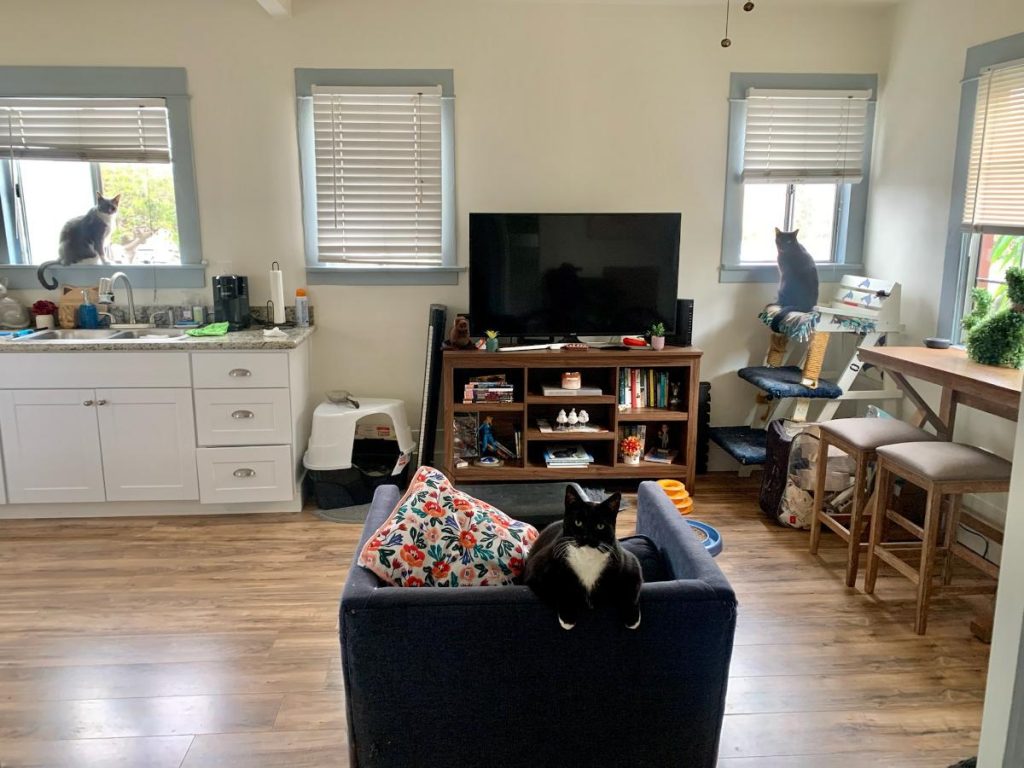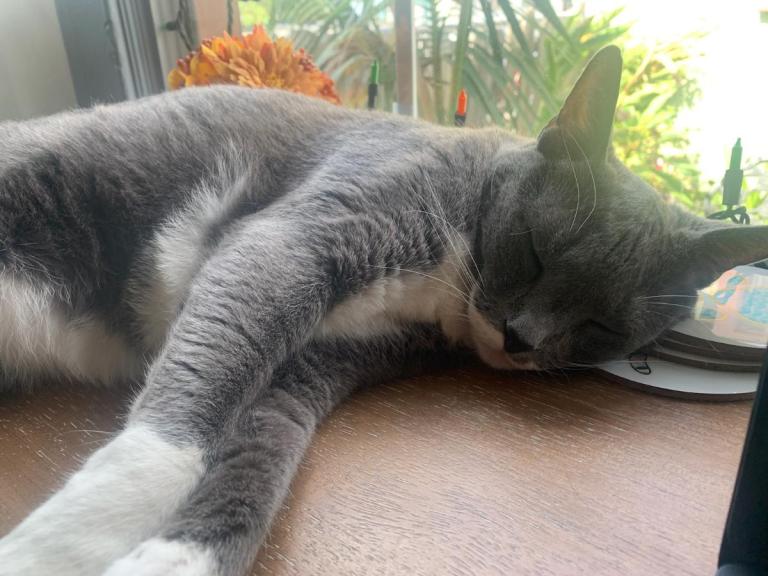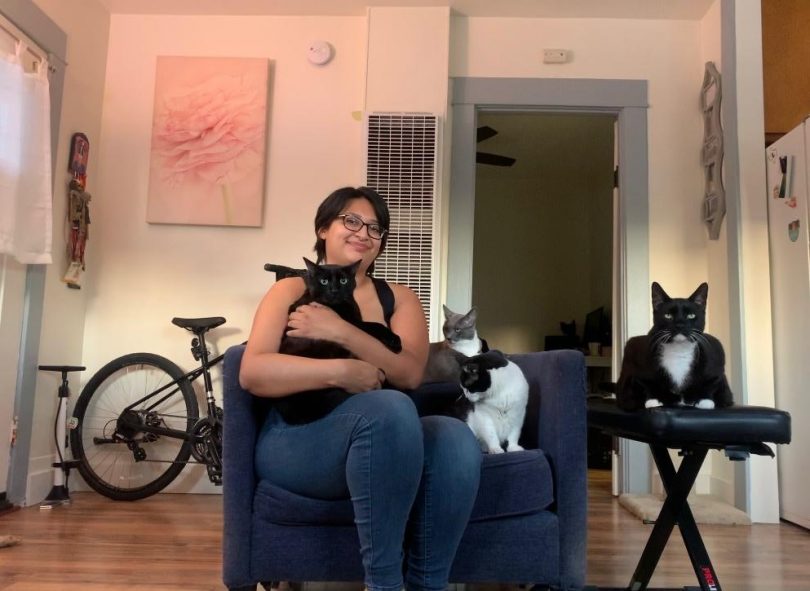By Carolina Reyes
This is the first in a series of essays by survivors of domestic violence in which they share what they wish others knew, what has helped them heal and how we can prevent violence.
In many households around the world, pets are an integral part of the family unit. They bring us joy and laughter with their unconditional love and quirky personalities. They provide a sense of belonging for those without a human family of their own.
I have four cats, whom I love more than anything in this world. The slogan on one of my many cat mugs perfectly encapsulates our bond: “I work hard so my cats have a good life.” My cats came to me as neonate kittens nine years ago and we have been inseparable ever since. Happiness does not begin to describe what they have brought into my life. In my loneliest moments, they have given me love and companionship. In my darkest, strength and a reason to push through. As a survivor of domestic violence who experienced years of physical abuse at the hands of an intimate partner, I can undoubtedly say that my cats saved my life.
My love for cats goes back to my childhood where my siblings and I would upset our parents by bringing home lost, stray animals we found in our neighborhood. Our parents would tell us to put them back outside, but we always ended up keeping them. As I got older, my love for animals grew. It led me to pursue a career in animal welfare, helping countless abandoned dogs and cats find a home, leading me to witness the incredible bond between pets and their families.
My life changed when I moved away from my hometown in urban Southern California, when I was 27. It was a bittersweet moment as I said goodbye to family and friends to start the next — and what I hoped would be exciting — chapter of my adult life. My then-partner and I, recent newlyweds, wanted a fresh start somewhere new. In contrast to the expensive, fast-paced city life we were used to, we decided on somewhere slow-paced and affordable and moved 120 miles east to the desert, along with the cats, and lived together for the first time.
It was difficult to see it then but being away from my support system meant I had no one close by to turn to when my relationship became abusive. I later learned that abusive partners often isolate their partners from family and friends to maintain control.
An even bigger barrier to escaping the abuse was the fact that I couldn’t find anywhere to take my pets. While domestic violence shelters offer resources and housing for people experiencing abuse, survivors with pets like myself learn very quickly that most shelters cannot accommodate animals. It forces domestic violence survivors to choose between leaving their pets behind or staying with an abusive partner. For years, I chose the latter.
Moving back home or finding a friend to lean on proved challenging. The first time I talked about the abuse with a friend, I was met with judgment and disbelief. After that, I kept the abuse a secret for years. I felt so much shame about the abuse that I was afraid to ask family or other friends for help. It was almost more painful to talk about the abuse than to experience the abuse itself. It was also painful to carry this secret, in a way I cannot explain. I was terrified that my loved ones would find out the truth. I also didn’t want to burden anyone by asking them to take in both me and my adult cats. Leaving my cats behind was not an option (my partner was abusive toward my cats as well). I decided to stay and hold on as long as I could.
The years seemed infinite but eventually, after three and a half years, my cats and I found safety. The road getting there wasn’t easy. The abuse broke me physically, mentally and emotionally. I survived not only the abuse but several suicide attempts due to years of isolation in a home I felt a prisoner to. On the night the abuse finally ended, my body had reached its breaking point. My former partner came home intoxicated and assaulted me, and I found the strength and courage to contact police via text message. He was arrested and received a restraining order. A judge, who I owe my life to, convicted him of domestic violence. The conviction gave me the validation I needed to open up to loved ones. While I feared I would not be believed, they instead met me with support and love.

My cats and I have now moved closer to family and have support. Sharing my experience with domestic violence was difficult at first, but with the help of my cats, support system and mental health counselors I have found strength in sharing my story.
I came to realize that, in sharing my experience, I am speaking up for survivors and others that are unable to do so. On behalf of them, I want to advocate for pet-friendly housing in domestic violence shelters, and for the protection of pets to be included along with survivors in restraining orders. I’d like to see legislation to support this so that others experiencing abuse can get to safety with their pets.

In our new home, my cats and I are healing while moving forward together. Star-lord sulking in the sunlight, Jack headbutting for head scratches, Susie meowing for me to hold her like a baby and Logan slowly coming out of his shell and rolling on his back when he gets some outdoor time. Those are the little moments that remind me why I couldn’t leave them behind. They also deserve to have a safe and loving home free of abuse.
I can’t emphasize enough how important pets are to the lives of many survivors like me. Without my cats, I am certain I would not have had the strength to keep going through the many difficulties I experienced, and to persevere and find a way out. Survivors should not have to abandon those they love most in order to get help. To save the lives of survivors, we must allow them to save their pets’ lives as well, just as my cats saved mine.
If you or someone you know is experiencing domestic violence, contact the National Domestic Violence Hotline at 1-800-799-7233 for support and referrals, or text “START” to 88788.
Anyone struggling with suicidal thoughts or other mental health challenges can call the National Suicide Prevention Lifeline at 800-273-8255, or contact the Crisis Text hotline by texting “HELLO” to 741741.
This story was produced in partnership with the California Health Report
Featured photo: Carolina Reyes with her four cats, Star-lord, Jack, Susie and Logan. Courtesy of Carolina Reyes.


I’m in the same boat. I can’t get out because I will NOT EVER leave my 4 cats to be abused. They are my life! They’ve kept me going the last 6 years. Thank you for your story, was hoping the end would tell me where I could go with them to safety.
I’m having the same prob maybe we can all get together and build or buy get grants for a abused women’s shelter that will allow us to leave about cats im in Texas and going to see what I can do here I have three cats and I won’t leave them either they are my life too and the jerk I’m with abusesb all of us and I don’t have family and do not know what to do
First, may I quote your essay in a newsletter I am sending to Judges in the Twentieth Judicial Circuit in Florida.
LADIES THERE ARE RESOURCES TO HELP YOU AND YOUR PETS GET OUT SAFELY. CALL YOUR LOCAL ABUSE SHELTER OR A HOTLINE.
i live in accomack county virginia my marriage has been filled with verbal and physical abuse the last two years i have called the police in my county many times and even thought i have had bruses and blood on my face they tell me if i want to press charges i have to go ask the magistrate for a warrant and protective order and if they wont give me one which they havent that i have to petion the court for a eviction order which i dont have the money to file i dont know what to do for me or my dogs i just want to be free even if i must die
I’m also in Texas Irving to be exact. I have called everyplace after a neighbor got my hopes up showing me article about Purina’s purple leash project. Helping survivors human and pet stay together. It’s been months of phone calls and emails and I did get one place that shelters limited few animals while they’re human gets better. My shepherd was healing from 4 broken legs near paws and stitches on her tummy she wasn’t even 7 months old and she’d been through so much. I never expected I’d be putting her in another abusive situation barely a year later. Bc of her past she doesn’t bond easily. 2 hours I sat down beside her feeding her beef jerky and telling her my brother passed away and he taught me how loving an animal can be. He used to say when I left house when we were younger always good to take backup sis . That meant firearm , friend or his dog. I made my shepherd a promise that day that I would do everything possible to give her happy life,She would forever be my Backup and I’d be hers! I was able to shield her when it first began… but she was my backup and I nearly went to jail when she showed where her loyalty was with me. Pride and fear overwhelmed me. But also mama bear took over and I thought several months later we were out. In Colorado cops knew and were helping me but family emergency ( my dad dying ( brought us to what I thought was maybe 2 weeks at most then abuser would stay with his family and Backup and I would head back to Colorado to live free if abused peace and happiness…..We got stranded my ride flaked going back and a year later it’s hard not to give in to suicidal thoughts but I have daughter and grandkids 2 hours from Colorado we were so close…. now it’s just getting through each day. If I one day and I’m in position to take purple leash idea to next level on steroids to help anyone stuck bc they believe in four legged etc love. She’s reason I fight to get us to peace and happiness ❤️. If I win lottery remember this. I’ll change lives with love sorry for the novel comment but today has been exceptionally hard… but we survived together.
Same situation, married at 16 last 7 years have been untolerable. Separate rooms took my money away. I’m currently taking care of our son who had a stroke but once his surgeries are over I need out. No family , never allowed to work. The promblem is my 2 dogs who have slept with me every night , emotionally supported me, I will never give them up. Life is so hard and getting harder. Feeling so hopeless